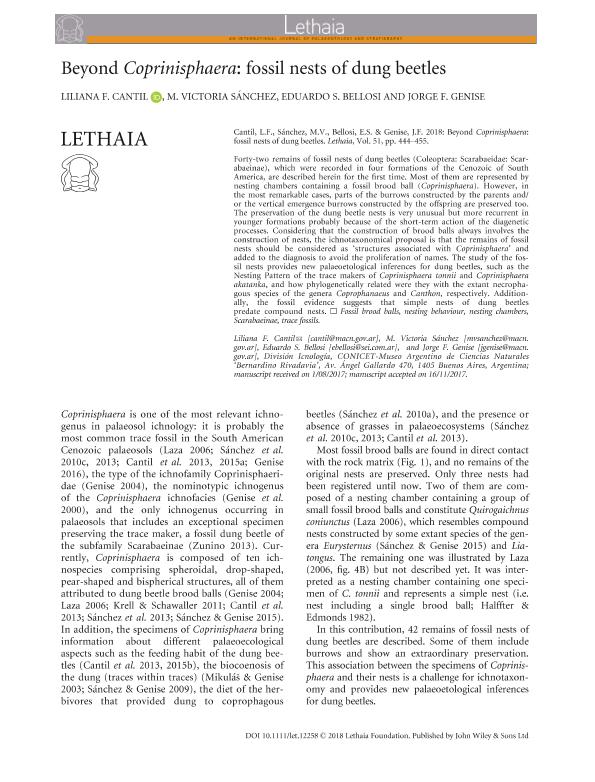Mostrar el registro sencillo del ítem
dc.contributor.author
Cantil, Liliana Fernanda

dc.contributor.author
Sánchez, M. Victoria
dc.contributor.author
Bellosi, Eduardo Sergio

dc.contributor.author
Genise, Jorge Fernando

dc.date.available
2020-01-06T14:46:30Z
dc.date.issued
2018-01
dc.identifier.citation
Cantil, Liliana Fernanda; Sánchez, M. Victoria; Bellosi, Eduardo Sergio; Genise, Jorge Fernando; Beyond Coprinisphaera: fossil nests of dung beetles; Wiley Blackwell Publishing, Inc; Lethaia; 51; 3; 1-2018; 444-455
dc.identifier.issn
0024-1164
dc.identifier.uri
http://hdl.handle.net/11336/93584
dc.description.abstract
Forty-two remains of fossil nests of dung beetles (Coleoptera: Scarabaeidae: Scarabaeinae), which were recorded in four formations of the Cenozoic of South America, are described herein for the first time. Most of them are represented by nesting chambers containing a fossil brood ball (Coprinisphaera). However, in the most remarkable cases, parts of the burrows constructed by the parents and/or the vertical emergence burrows constructed by the offspring are preserved too. The preservation of the dung beetle nests is very unusual but more recurrent in younger formations probably because of the short-term action of the diagenetic processes. Considering that the construction of brood balls always involves the construction of nests, the ichnotaxonomical proposal is that the remains of fossil nests should be considered as ‘structures associated with Coprinisphaera’ and added to the diagnosis to avoid the proliferation of names. The study of the fossil nests provides new palaeoetological inferences for dung beetles, such as the Nesting Pattern of the trace makers of Coprinisphaera tonnii and Coprinisphaera akatanka, and how phylogenetically related were they with the extant necrophagous species of the genera Coprophanaeus and Canthon, respectively. Additionally, the fossil evidence suggests that simple nests of dung beetles predate compound nests.
dc.format
application/pdf
dc.language.iso
eng
dc.publisher
Wiley Blackwell Publishing, Inc

dc.rights
info:eu-repo/semantics/openAccess
dc.rights.uri
https://creativecommons.org/licenses/by-nc-sa/2.5/ar/
dc.subject
FOSSIL BROOD BALLS
dc.subject
NESTING BEHAVIOUR
dc.subject
NESTING CHAMBERS
dc.subject
SCARABAEINAE
dc.subject
TRACE FOSSILS
dc.subject.classification
Paleontología

dc.subject.classification
Ciencias de la Tierra y relacionadas con el Medio Ambiente

dc.subject.classification
CIENCIAS NATURALES Y EXACTAS

dc.title
Beyond Coprinisphaera: fossil nests of dung beetles
dc.type
info:eu-repo/semantics/article
dc.type
info:ar-repo/semantics/artículo
dc.type
info:eu-repo/semantics/publishedVersion
dc.date.updated
2019-10-16T19:27:43Z
dc.journal.volume
51
dc.journal.number
3
dc.journal.pagination
444-455
dc.journal.pais
Reino Unido

dc.journal.ciudad
Londres
dc.description.fil
Fil: Cantil, Liliana Fernanda. Consejo Nacional de Investigaciones Científicas y Técnicas. Oficina de Coordinación Administrativa Parque Centenario. Museo Argentino de Ciencias Naturales “Bernardino Rivadavia”; Argentina
dc.description.fil
Fil: Sánchez, M. Victoria. Consejo Nacional de Investigaciones Científicas y Técnicas. Oficina de Coordinación Administrativa Parque Centenario. Museo Argentino de Ciencias Naturales “Bernardino Rivadavia”; Argentina
dc.description.fil
Fil: Bellosi, Eduardo Sergio. Consejo Nacional de Investigaciones Científicas y Técnicas. Oficina de Coordinación Administrativa Parque Centenario. Museo Argentino de Ciencias Naturales “Bernardino Rivadavia”; Argentina
dc.description.fil
Fil: Genise, Jorge Fernando. Consejo Nacional de Investigaciones Científicas y Técnicas. Oficina de Coordinación Administrativa Parque Centenario. Museo Argentino de Ciencias Naturales “Bernardino Rivadavia”; Argentina
dc.journal.title
Lethaia

dc.relation.alternativeid
info:eu-repo/semantics/altIdentifier/url/http://doi.wiley.com/10.1111/let.12258
dc.relation.alternativeid
info:eu-repo/semantics/altIdentifier/doi/http://dx.doi.org/10.1111/let.12258
Archivos asociados
